Why Electrolytes are so Important, Especially in Summer
By Amelie Kokorsky
Due to excessive sweating at high temperatures, the body loses important minerals - the so-called electrolytes.
The more the horse exerts itself, with or without a rider, the more it will sweat. A large horse can produce up to 5 litres of sweat on particularly warm days, even with light walk-trot work. Actually, the horse can cover its mineral balance with a good mineral feed, but if the sweat loss is too high, the intake of a simple mineral feed is sometimes not sufficient, as the animal does not absorb enough electrolytes through this. The mineral loss should be compensated for on particularly warm days by adding electrolytes. The most important minerals to balance are magnesium, sodium and chloride. Whether you provide the minerals to the horse via pellets, lick bowls or as liquid does not play a major role. What is important is the content and composition of the minerals.
Tip: In order to be able to supply your horse optimally with minerals, you can have the content of minerals in the soil measured and thus react even more precisely to possible deficiency symptoms.
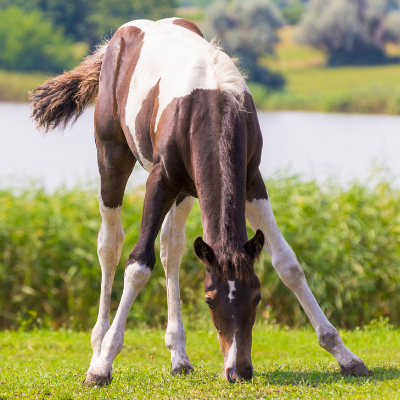
Important Minerals in Detail
Sodium
Sodium is extracted from the food pulp during the horse's digestion in the large intestine. A sodium deficiency can be caused by persistent diarrhoea, kidney disorders and also heavy sweating. If a sodium deficiency develops, it can lead to disturbances in the production of bile, imbalances in the acid-base and water balance and problems with muscle tension. Horses with a sodium deficiency often show a strongly pronounced "licking behaviour": The animals will lick extensively at anything that is near them. This includes tethers, metal bars on the stall or the pasture gate, earth and stones. They also like to lick us humans. As a sodium deficiency can quickly lead to constipation colic, the first signs of a deficiency can be dry faeces and infrequent defecation. Stiefelix Banana and Apple Lick Bowls contain sodium chloride. The sodium chloride contained in the lick trays can compensate for a possible loss of sodium through sweating. Stiefel Electrolyte and Stiefel Electrolyte Liquid are also an excellent source of sodium chloride. Both products can help to compensate for deficiencies in sodium chloride.
Chlorine
It is actually difficult to properly separate sodium and chlorine, as they should always be seen as "partners" when feeding. A deficiency of chlorine can also be caused by persistent diarrhoea or excessive sweating. Chlorine also plays an important role in muscle work and the regulation of the acid-base balance together with sodium. In addition, the production of stomach acid depends on chlorine in the horse's organism. To compensate for possible deficiencies, Stiefel Elektrolyt can be used. On warm days, the powder can help to compensate for the loss of chlorine through sweat.
Magnesium
If a horse sweats more in high temperatures, the loss of magnesium may also be increased. Magnesium is involved in many important processes in the horse's body. A deficiency of magnesium can therefore also become noticeable through many different symptoms. One of the most important functions of magnesium is its involvement in muscle work and the transmission of a nervous stimulus (More information on this in our blog post Muscle tension due to nutrient deficiency - Part 1). If heavy sweating in summer leads to too much loss of magnesium, this deficiency can cause muscle tremors, muscle cramps and tension in the muscles. In short, magnesium can be described as a "must-have" among supplementary feeds for sweaty work. Even if horses can cover a large part of their magnesium requirements through pasture grass or good hay, a deficiency can occur during a hot spell. This deficiency can be compensated for with Stiefel Mag12 Powder, Stiefel Mag12 Pellet or Stiefel MagPower Liquid. All products contain magnesium oxide. Magnesium oxide is an inorganic source, but it can have up to 70% bioavailability (source: Fritz, Christiane (2019): Pferde fit füttern, p. 101).
For horses that either only come to the meadow by the hour or are on meadows that have mineral-poor soil, Stiefel Organic Mineral is suitable as a daily feed supplement. The high-quality mineral feed contains sodium chloride and magnesium oxide and can ensure a continuous supply of the two important minerals throughout the summer season when given daily. It is grain-free and has a high bioavailability, so it can also be fed to horses with (seasonal) metabolic problems.
Tip: Treat your horses to a salt lick in the field and in the stable during the summer season. The horses will use it instinctively (on hot days) and prevent a lack of sodium and chlorine. But ATTENTION! If the horses eat the stone within a few days, you should take the stone away from them and get to the bottom of the cause. Also "eating up" out of boredom should not be done.
Latest reviews
-
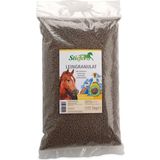 5.0 (7)
5.0 (7)Stiefel Linseed Granules, 5 kg
Bestseller- Ready-to-feed linseed cake
- High mucilage content
- Reduced fat content due to cold pressing
£17.80 (£3.56 / kg)Delivery by February 09
-
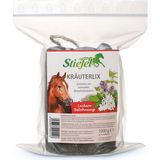 4.8 (10)
4.8 (10)Stiefel Kräuterlix Horse Lick, 1 kg
- Lick stone with bronchial herbs
- A tasty reward
- With attached cord to tie it up
£13.33 (£13.33 / kg)Delivery by February 09
-
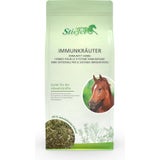 5.0 (8)
5.0 (8)Stiefel Immunity Herbs , 1 kg
Bestseller- 100% natural herbal mixture
- Immunity herbs
- Good for the body's defences
£22.27 (£22.27 / kg)Delivery by February 09
-
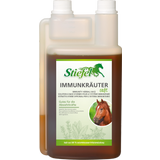 4.8 (6)
4.8 (6)Stiefel Immunity Herbal Liquid, 1 l
New!- To support the immune system
- Made of 100% natural herbs
- No added sugar
£15.12 (£15.12 / l)Delivery by February 09
-
Great Britain: Free standard delivery from £79.90
-
Free
returns Secure payments
with SSL encryption technology

